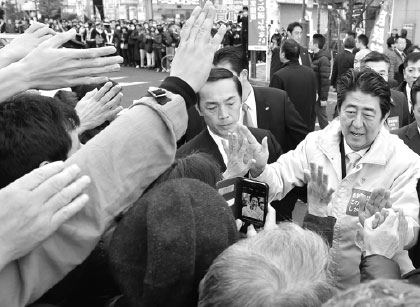Japan's right-wing media, government 'stifling liberal voices'
A chill wind is blowing through Japan's media as a resurgent political right wing pressures the country's liberal voices in what analysts say presents a threat to democracy as voters head to the polls for a general election.
Cheered on by fringe groups, the mainstream conservative press and the government of Prime Minister Shinzo Abe are tightening the vise on left-of-center voices.
A letter sent last month from Abe's ruling Liberal Democratic Party to Tokyo-based broadcasters demanding "fair" coverage in the run-up to this weekend's vote sent a shiver through the industry.
While the wording was tame, it awakened an institutional memory of 1930s Japan, when the press was strictly censored as military rulers marched the country toward war.
Coupled this week with the effective date of a state secrets act that opponents say will stymie legitimate criticism by the media, campaign groups are warning of an increasingly unhealthy atmosphere.
The Japanese chapter of PEN International, an association of writers, said the law means the government "can now conceal military, intelligence and any inconvenient information in an arbitrary manner", in what it called the "return of the heavy-handed state".
Broadcasters and newspapers should fight back against attempts to muzzle them, said Yasuhiko Tajima of Japan's Sophia University, one of several analysts to sound an alarm over the recent moves.
"Regardless of ideologies, the media's role is as a watchdog of power for citizens," he said. "Journalists shouldn't forget this principle - media are very important to democracy."
Wartime legacy
But it is in the realm of Japan's powerful multimillion-circulation newspapers where the right wing is making the most notable headway.
Their biggest scalp was the country's premier liberal newspaper, Asahi Shimbun, which retracted decades-old articles on Japan's wartime system of sex slavery in August, after years of calls for it to do so.
The paper claimed its chief source for the stories was not credible and apologized. The company's president also resigned.
Rivals jumped on the retraction, with Abe claiming it amounted to proof of a "smear".
Mainstream researchers estimate that up to 200,000 women from Korea, China, Indonesia and the Philippines served Japanese soldiers as sex slaves at so-called "comfort stations". The women were not willing participants, and the Imperial Japanese Army and wartime government were involved in their enslavement, mainstream researchers say.
|
Japanese Prime Minister Shinzo Abe (second from right) greets supporters after his election campaign speech for the upcoming lower house election, in Tokyo on Monday. Kazuhiro Nogi / Agence France-Presse |
(China Daily 12/10/2014 page11)















